A Hen in the Wind Blu-ray Movie
HomeA Hen in the Wind Blu-ray Movie 
風の中の牝鶏 / Kaze no naka no mendoriBFI Video | 1948 | 84 min | Rated BBFC: PG | No Release Date
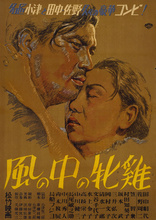
Price
Movie rating
7.1 | / 10 |
Blu-ray rating
| Users | 0.0 | |
| Reviewer | 4.5 | |
| Overall | 4.5 |
Overview
A Hen in the Wind (1948)
Tokiko is a mother forced to turn to sex work in order to pay off her ill son's medical bills. When her husband returns home from the war, her suffering is compounded by his refusal to forgive her actions.
Starring: Kinuyo Tanaka, Shűji Sano, Chishű Ryű, Hohi Aoki, Chiyoko FumiyaDirector: Yasujirô Ozu
| Foreign | Uncertain |
| Drama | Uncertain |
Specifications
Video
Video codec: MPEG-4 AVC
Video resolution: 1080p
Aspect ratio: 1.37:1
Original aspect ratio: 1.37:1
Audio
Japanese: DTS-HD Master Audio 2.0 Mono
Japanese: DTS-HD Master Audio 2.0 (48kHz, 24-bit)
Subtitles
English
Discs
Blu-ray Disc
Single disc (1 BD)
Packaging
Slipcover in original pressing
Playback
Region B (A, C untested)
Review
Rating summary
| Movie | 4.5 | |
| Video | 5.0 | |
| Audio | 4.5 | |
| Extras | 1.5 | |
| Overall | 4.5 |
A Hen in the Wind Blu-ray Movie Review
Reviewed by Dr. Stephen Larson December 14, 2023A Hen in the Wind (1948) is being released as part of the BFI's two-disc set, Three Films by Yasujirō Ozu.
In his illuminating commentary track on this disc, esteemed film critic Adrian Martin makes the salient point that A Hen in the Wind is one of the rare Ozu films that has an explicit political theme. In the case of this picture, it's about the postwar condition in Japan, a national identity that's once again searching for purity, and the repatriated soldier. As Jonathan Rosenbaum points out in the booklet, the film is set in an industrial slum in eastern Tokyo. A 28-year-old mother named Tokiko Amamiya (Kinuyo Tanaka) lodges in another family’s home on the second floor of a Shitamachi house (an old Japanese house) with her 2-year-old son son Hiroshi while awaiting the return of Tokiko's husband Shūichi (Shuji Sano), who fought in WWII and remains in the Japanese army. Tokiko feeds Hiroshi a cake and he becomes sick. When she finds her son unresponsive, Tokiko quickly brings Hiroshi to the local doctor, who diagnoses the toddler with colitis and a fever. Hiroshi starts feeling better but Tokiko faces a financial dilemma about how to pay for his medical expenses. She is a dressmaker and has sold her last kimono. Tokiko considers selling the family's furniture but wants Shūichi to come back to a familial abode with all their possessions intact. She is introduced to a madam named Orie Noma (Reiko Minakami), who encourages Tokiko to work as a prostitute at her bordello to help cover the bills. Tokiko initially resists but is in such dire economic straits that she reluctantly agrees to be one of Orie's workers for an evening. Tokiko's best friend Akiko Ida (Chieko Murata) is appalled at what she does and questions why she didn't approach her first for money.
When Shūichi returns home, he is at first happy to see his wife and child. He is ever curious, though, about how Tokiko paid for the treatment of Hiroshi's condition. Tokiko initially withholds the reason before divulging it. Shūichi is very angry at his wife for prostituting herself and begins a brisk estrangement. He demands to know where Tokiko worked and get her directions to the brothel. There he meets 21-year-old Fusako Onada (Chiyoko Ayatani), who he asks a litany of questions about how she became a sex worker. Fusako says she has to do it to support her family. The two later become friendly with Shuichi explaining that he wants to help her get a "proper" job. Shūichi approaches Kazuichiro Satake, his company's office boss (Chishu Ryu), about getting Fusako a job. Satake is all the willing to help Fusako but questions Shūichi why he can't forgive his wife.
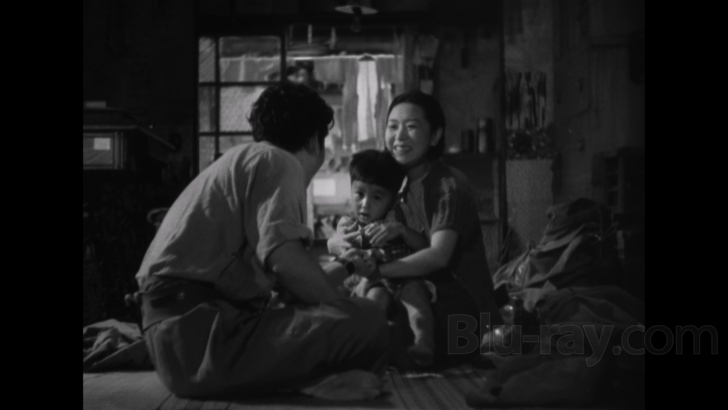
Daddy's back home.
It is evident that Shūichi's war experience and time in the army has hardened him. His disposition and actions show that he likely has at least some PTSD in him. (Of course, it would still be many years after 1947 before PTSD became fully recognized and studied.) In the ways that he approaches Tokiko and Fusako in a confrontational manner, Shūichi practically acts like a military officer. He must have lost tinges of humanity in his years of war service. For instance, when Fusako discloses that her mother died, Shūichi shows no emotion or compassion. He immediately asks the young lady his next question. A Hen in the Wind contains two shocking acts, which I will not spoil for those who haven't seen the film. As sad as the movie is at times, it's ultimately about a process of healing for Shūichi and Tokiko. Given when this film was made, the same can be said for Japan as a whole.
A Hen in the Wind Blu-ray Movie, Video Quality 
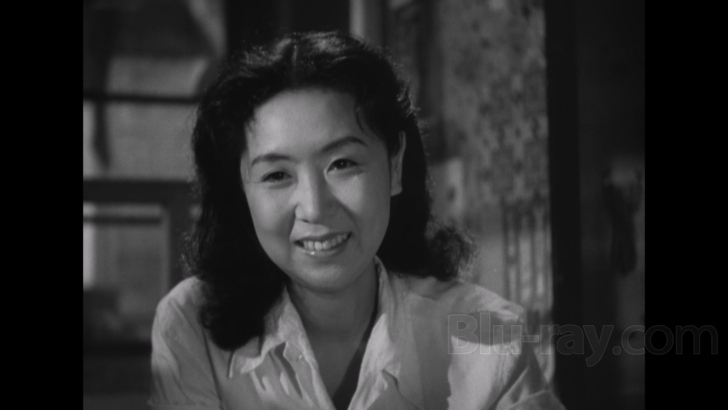
A Hen in the Wind was only available on SD in the BFI's 2011 Blu-ray/DVD combo release with An Autumn Afternoon (on the BD), which my colleague Dr. Svet Atanasov covered a dozen years ago. The following text appears in the BFI's booklet:
A Hen in the Wind was digitally restored in 2022. The 4K restoration was managed by Shochiku and conducted by IMAGICA Entertainment Services, Inc. with the support of The Japan Foundation. Colour correction supervised by Masashi Chikamori and sound restoration supervised by Kazunori Shimizu.In his book, Ozu and the Poetics of Cinema, David Bordwell writes about the image properties he noticed in a print of A Hen in the Wind that he watched: "The photographic quality of the film has a crispness of definition that is absent from Ozu's previous talkies. (Perhaps he started to use arc lighting and the improved Eastman black-and-white stocks.) The new sharpness of detail permits him to create unprecedented nuances of gesture and framing...With a greater image definition available, Ozu need not shoot close-ups of transitional objects; he can film in long-shot but use the gray scale and image composition to make the object prominent" (p. 304). The frame grabs printed in Bordwell's book are pretty clear indeed. It's unknown whether this particular print was sourced for Shochiku and IMAGICA's restoration, but in any case, the BFI's 4K-scanned transfer looks terrific. Keep in mind that A Hen in the Wind is aesthetically and tonally a very dark film with a lot of scenes shot at night. It's apropos that Bordwell mentions the film's grayscale because it's consistently prevalent. Grays are very pronounced. The image frequently has a charcoal look to it. The monochrome looks wonderful. The transfer has minimal traces of damage. The only anomaly is a tramline along the outer right edge of the frame for a brief scene or two (see Screenshot #20). The BFI has encoded the MPEG-4 AVC-encoded BD-50 (which includes both A Hen in the Wind and Record of a Tenement Gentleman) at an average video bitrate of 34890 kbps.
The BFI has provided ten chapters for the 84-minute feature.
A Hen in the Wind Blu-ray Movie, Audio Quality 
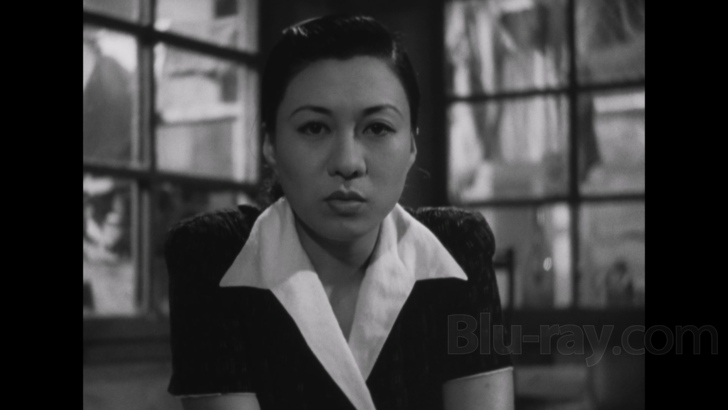
The BFI has supplied two audio tracks in Japanese (both in lossless): a DTS-HD Master Audio Dual Mono (833 kbps, 16-bit) and a DTS-HD Master Audio Dual Mono (1526 kbps, 24-bit). The disc's menu gives the viewer the option to listen to either the restored audio track or an unrestored mix. I listened to both. The restored mix only has hiss that's faintly audible in the background. The unrestored track has more noticeable hiss in the fore but dialogue and music can be heard at some decibels higher when played at a similar volume level compared to the remastered sound track. I don't think one can go wrong with either mix.
Optional white English subtitles appear towards the bottom of the image.
A Hen in the Wind Blu-ray Movie, Special Features and Extras 
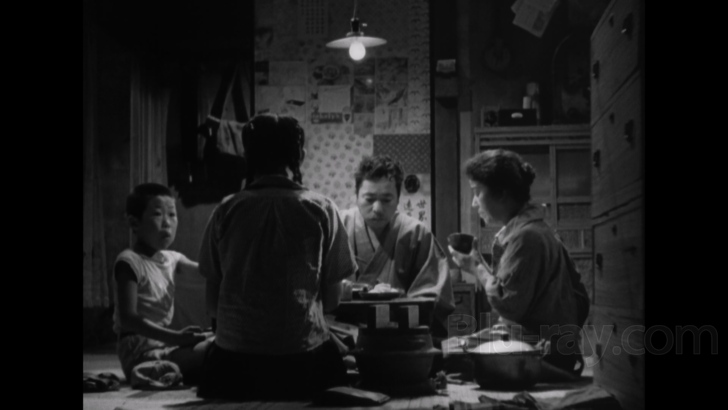
- NEW Audio Commentary by Film Critic Adrian Martin - a feature-length track from the always-productive film critic and screenwriter Adrian Martin. He prefaces his commentary by promising that he won't critique A Hen in the Wind with the same traditional approaches that have been used to analyze Ozu's work. While he cites older works by scholars, he maintains his promise and delivers fresh insights about the film. Martin examines Japan's postwar milieu and how the characters in the picture are affected by it. Martin also discusses the movie's style, including its sound design. He covers a variety of topics well. In English, not subtitled.
A Hen in the Wind Blu-ray Movie, Overall Score and Recommendation 
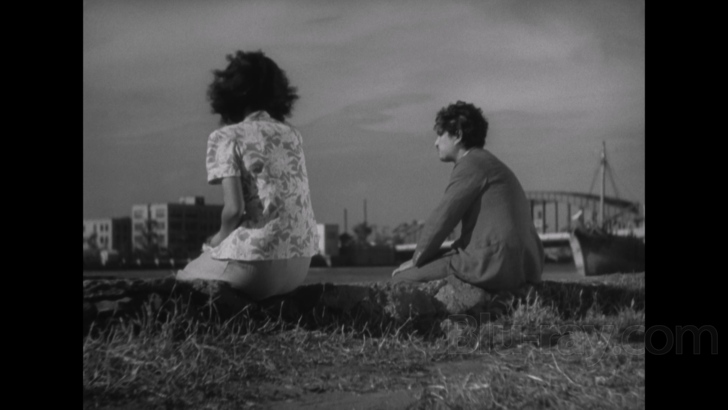
Bordwell observes in his Ozu book: "Little circulated and rarely shown, A Hen in the Wind is one of Ozu's least-discussed postwar films" (p. 302). I hope that the BFI's release serves as a corrective in granting this great movie wider exposure and a new audience. It features excellent performances by Kinuyo Tanaka and Shuji Sano, who portray a couple hampered by economic calamities and emotional scars from the war. The BFI's transfer is the finest one in this volume. Adrian Martin's commentary covers a range of Ozu's filmmaking techniques. This is the best film in the set. VERY HIGHLY RECOMMENDED.
Similar titles
Similar titles you might also like
(Still not reliable for this title)

Record of a Tenement Gentleman
長屋紳士録 / Nagaya shinshiroku
1947

Dragnet Girl
非常線の女 / Hijôsen no onna
1933

Adoption
Örökbefogadás
1975

The Mourning Forest
殯の森 / Mogari no mori | Masters of Cinema
2007

The Boys from Fengkuei
風櫃來的人 / Fēng guě lái de rén / All the Youthful Days | Masters of Cinema
1983

Devi
The Goddess
1960

Our Little Sister
海街diary / Umimachi Diary
2015

There Was a Father
1942

Elles
2011

A Tale of Sorrow and Sadness
悲愁物語 / Hishū monogatari | Limited Edition
1977

Edward and Caroline
Édouard et Caroline / Vintage World Cinema
1951

Aquarius
Arrow Academy
2016

Julieta
2016

Goto, Isle of Love
Goto, l'île d'amour / Arrow Academy
1969

Murmur of the Heart
Le souffle au coeur / Dearest Love
1971

Bakumatsu Taiyō-Den
幕末太陽傳 / A Sun-Tribe Myth From the Bakumatsu Era / Masters of Cinema
1957

Mandabi
Vintage World Cinema | Le Mandat / The Money Order
1968

It All Starts Today
Ça commence aujourd'hui
1999

Pain & Glory
Dolor y gloria
2019

Diary of a Lost Girl
Tagebuch einer Verlorenen / Masters of Cinema
1929